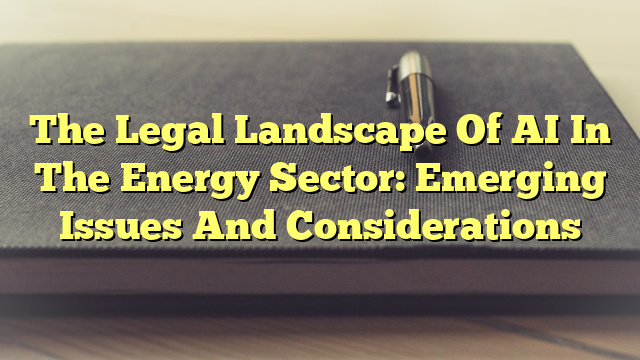Table of Contents
Key Challenges of AI in the Energy Sector
AI technology has the potential to revolutionize the energy sector, but it also brings several challenges that need to be addressed. One of the key challenges is the ethical use of AI in decision-making processes. As AI systems become more sophisticated, they may make decisions that have significant impacts on the energy industry and society as a whole. Ensuring that these decisions are fair, transparent, and accountable is crucial.
Another challenge is the integration of AI systems into existing energy infrastructure. AI technologies require large amounts of data to function effectively, and integrating these systems with legacy infrastructure can be complex and costly. Additionally, there may be concerns about data privacy and security when using AI in the energy sector.
Key Legal Issues of Artificial Intelligence
The use of AI in the energy sector raises several legal issues. One of the main concerns is liability. If an AI system makes a decision that results in harm or damage, who is responsible? Is it the developer of the AI system, the operator, or both? Determining liability in these cases can be challenging, especially when AI systems are autonomous and make decisions without human intervention.
Another legal issue is intellectual property. AI systems rely on algorithms and models that may be subject to copyright or patent protection. Determining ownership and licensing rights for these AI technologies can be complex, especially when multiple parties are involved in their development.
Legal Status of Artificial Intelligence Issues and Challenges
The legal status of AI issues and challenges varies across jurisdictions. Some countries have started to develop specific regulations and guidelines for the use of AI in different sectors, including energy. However, there is still a lack of comprehensive international legal frameworks that address the unique challenges posed by AI.
Many legal systems are still catching up with the rapid advancements in AI technology. As a result, there is often uncertainty and ambiguity surrounding the legal status of AI-related issues, such as liability and data protection. It is crucial for policymakers and legal experts to collaborate and develop clear and consistent legal frameworks to address these challenges.
Impact of AI on the Energy Industry
The impact of AI on the energy industry is expected to be significant. AI technologies can optimize energy production and consumption, improve grid management, and enhance energy efficiency. These advancements can lead to cost savings, reduced emissions, and a more sustainable energy sector.
However, the widespread adoption of AI in the energy industry may also lead to job displacement and workforce changes. As AI systems automate certain tasks, there may be a shift in job roles and skill requirements. It is important for the energy industry to proactively address these workforce challenges and ensure a smooth transition to an AI-enabled future.

